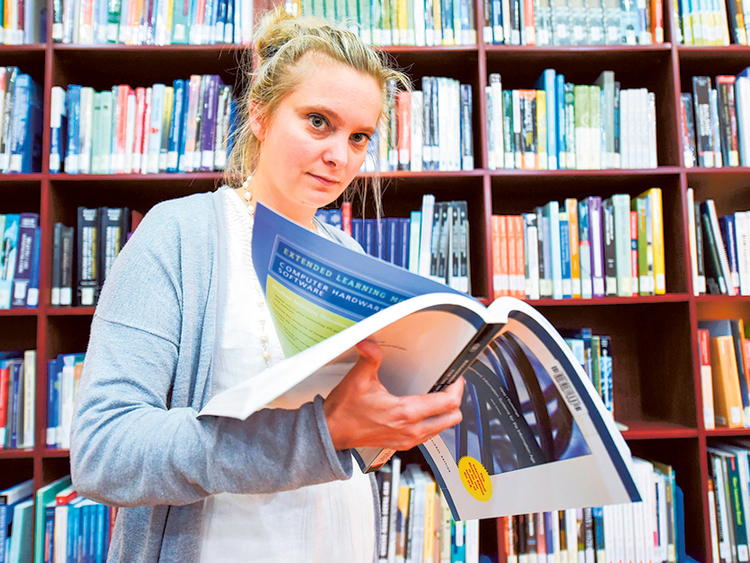
Dubai: As students face mounting pressure in trying to keep up with the digital Joneses, one inevitable fallout is a distracted mind which can impair their studies and exam preparation, said experts. With exam time nearly upon students for some curriculums in the UAE, a Dubai-based professor’s research into an extraordinary psychological phenomenon that she says can help young minds calm down and turn their focus on their studies finds particular resonance.
Dr Franziska Apprich, assistant professor in the School of Communication and Media Studies at the Canadian University of Dubai (CUD), told Gulf News that the ASMR (Autonomous Sensory Meridian Response), a phenomenon that involves listening to certain simple sounds, could help alleviate mental pressure and calm anxiety, and as a result, greatly help students to dispel their exam stress and focus on their studies.
The ASMR is described as a ‘tingling sensation’, and is often triggered by exposure to specific audio and video content such as listening to whispering sounds, sound of running water, soft animal noises, the hush of folding towels or soft brushing. The term ‘autonomous sensory meridian response’ is attributed to a New York-based cyber security professional, Jennifer Allen.
Though there has been little scientific research on it, for almost a decade, ASMR has been an unexplained hit on social media and other forums. Scientific studies have only recently kicked off and Dr Apprich has been a leading force in what she believes is an under-investigated scientific field.
The study, an extension of Dr Apprich’s previous work, has been selected for publication by the prestigious international Organisation of Scientific Research, which collaborates with high-profile entities such as Nasa. The paper aims to showcase to the wider scientific and teaching communities the impact AMSR can have in modern society and in education in particular.
“I discovered ASMR when I was very young and it offered me a sense of peace. It didn’t have a name then so I thought I was on my own,” said Dr Apprich.
As a child, she would listen to her dad read the newspaper and the rustling of the paper would help her “relax in a way where I would have my best ideas”.
Born and raised in Germany, Dr Apprich’s studies have led her to travel all around the world. She came to Dubai six years ago and for the past three years, has been researching ASMR in collaboration with a Dubai-based centre of neurology. Exposure to such sounds can help the anxious-minded calm down, she said.
Dr Apprich explained that the state of calm as a neurological flat line in brain activity. “It’s [because] your brain shuts down when you perceive certain sounds and rather than having peaks of anxiety and awareness, you see nearly a straight line. You’re still fully aware and in the present ... you slow down your brain and feel at ease with everything [around you],” she explained.
But a major challenge in disseminating the benefits of ASMR has been the scepticism regarding its value in real-life application due to lack of scientific proof, said Dr Apprich.
“I went to the neurology centre [in Dubai] and they at first obviously laughed at me. They didn’t know what I was talking about but [soon] discovered that it really worked,” said Dr Apprich.
“My data collection at the neurology centre proved that ASMR sounds make you experience a state of calm while being fully conscious. This is the best given starting point for any creative or critical thinking exercise.”
After testing 50 or so patients, and with research still ongoing, they noticed changes in brain activity while listening to ASMR.
“We measured it on people who have anxiety, depression, eating disorders, sleeping disorders and so forth, and they noticed that even without medication, they achieved a sense of calm while being fully conscious,” she said.
The professor recommends parents and students to try ASMR and see which sounds work best for an individual. Dr Apprich also plays ASMR for her students before they sit for an exam in order to help them concentrate. “You can click on YouTube, pick any of the sounds [that fit into the ASMR category] and see what works for you.”
According to Dr Apprich, “[Today’s] obsessive interaction with technical devices has created a social media generation who are easily distracted, have low attention, sleeping and eating disorders, and anxiety.
“For this reason, it is important that educators, researchers, parents and youngsters become aware of the nature of AMSR and its unique benefits.”
The key to any writing or innovation, she believes, lies in focus and concentration. “Let your imagination take you to places that you yourself are surprised by and be allowed enough space and time to flourish.”
Alison Xiao is an intern with Gulf News.








